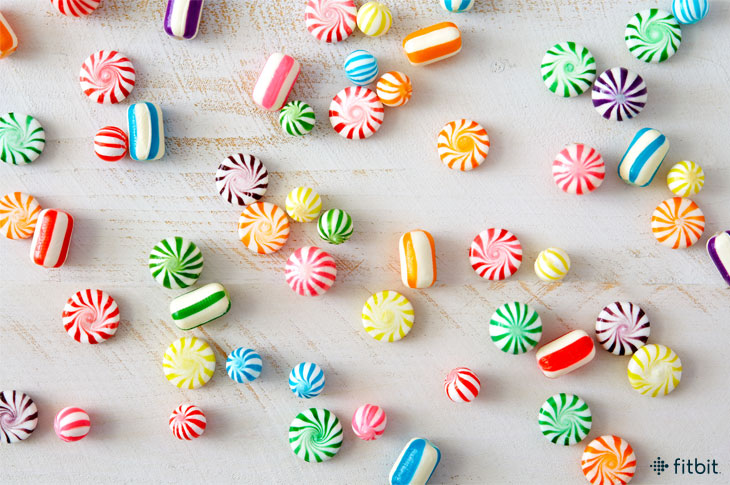
You’ve definitely heard it before—too much sugar isn’t good for you. The recommended limit has been lowered to no more than 6 teaspoons of added sugar per day, but most Americans consume way more, mainly in sugar-sweetened drinks, like soda, energy drinks, and sports drinks, and snacks, like cakes, cookies, and candy. Discover what actually happens to your body when the sweet stuff hits your bloodstream.
1. Sugar is calorie rich, nutrient poor
Sugar provides pure calories and is completely lacking other essential nutrients, such as fiber, vitamins, and minerals. Sugary drinks and foods generally don’t fare much better, and they take up room in your diet that could otherwise be filled with more nutritious foods.
2. Sugar is terrible for your teeth
Bacteria in your mouth love sugar—particularly sucrose, from everyday granulated sugar. When the bacteria munch on the sugar they produce acid, and you end up with holes in your teeth. Eating sticky sugar, like caramels or gummies, which attach to your teeth, is even worse.
3. Sugar doesn’t fill you up
And liquid forms are the worst offenders—soft drinks aren’t exactly filling. You generally still want to eat, despite the huge hit of sugar you’ve just injected into your gut. Think about it this way: how quickly can you drink a can of soda? To get the equivalent 9 teaspoons of sugar in a 12 fl oz can of soda, you’d need to eat 7 cups of raspberries. Yep, 7 fiber-rich, filling cups!
4. Sugar can be addictive
Your brain is hardwired to love sugar, its favorite form of energy. It’s a matter of survival: When you eat food, dopamine is released in the brain, which makes you feel happy. But certain foods, like sugar, make dopamine levels soar. In a similar way to how the brain reacts to cocaine, sugar can be addictive—the more you eat, the more you need to satisfy that “high.”
5. Sugar could stress you out
Fast, easily digested carbs cause powerful spikes in your blood sugar levels, sending you on a wild rollercoaster ride of energy highs and lows throughout the day. The highs can give you a quick energy burst, but they also put pressure on your pancreas to produce more insulin in an effort to lower your blood sugar. The lows that follow can make you feel ravenous (hangry, even!), frantically searching for another sugar rush.
6. Sugar can lead to inflammation
Too much sugar, and high glycemic index foods, results in substances called AGEs being produced in your blood. These potent pro-oxidant chemicals (the opposite of a healthy antioxidant) cause inflammation, and left for too long, chronic inflammation can lead to diabetes and heart disease.
7. Sugar might make you, and your liver, fat
There’s no denying the facts—consuming too many calories leads to weight gain. It’s far too easy to tip your energy input over the edge with high sugar drinks and snacks. You already know being overweight or obese can be a fast-track ticket to a whole host of scary health problems, including cancer. Eating too much fructose, in particular, which is converted into fat and stored in the liver, can lead to non-alcoholic fatty liver disease—a condition healthy weight people can develop, particularly if you drink too much soda.
8. Sugar can mess with your metabolism
Constantly flooding your blood with sugar, even if you’re not overweight, is never a good thing. Your pancreas has to work extra hard to keep your blood sugar levels within a healthy range, your blood pressure increases, and your blood fats go up, too. If these things are constantly happening, you can develop metabolic syndrome, a cluster of conditions which can lead to diabetes and heart disease.
Thankfully, it’s not all doom and gloom. Lowering your sugar intake is easy if you know what to look for on food labels. The new nutrition facts label will also call out added sugars versus naturally occurring sugars, making it that much easier to see what you’re getting! If you skip sugary drinks, eat real, minimally processed foods, and have a light hand when it comes to adding sweeteners, you can drastically reduce the sugar in your life and improve your overall health.
This information is for educational purposes only and is not intended as a substitute for medical diagnosis or treatment. You should not use this information to diagnose or treat a health problem or condition. Always check with your doctor before changing your diet, altering your sleep habits, taking supplements, or starting a new fitness routine.

If you have questions about a Fitbit tracker, product availability, or the status of your order, contact our Support Team or search the Fitbit Community for answers.
Please note: Comments are moderated and may not appear immediately after submission.